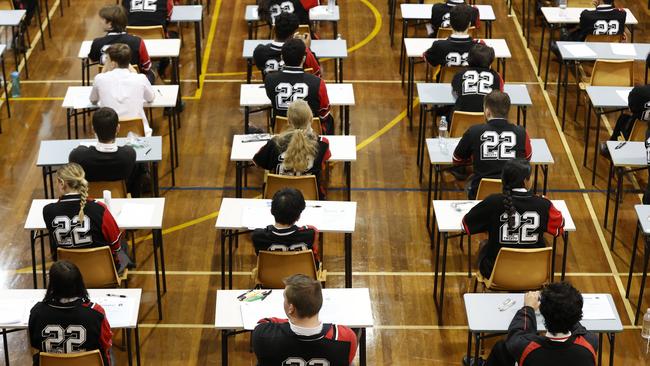SACE exams 2023: Expert guide to English Literary Studies
An experienced teacher and private tutor gives her expert tips on how students can nail the English Literary Studies exam - and the one thing not to do.

Education
Don't miss out on the headlines from Education. Followed categories will be added to My News.
The following tips have been written specifically by highly experienced English teacher, SACE achievement officer and senior Tutors SA tutor Kristina Palmer for English Literary Studies students with practical ways to ace the exam.
SACE exam time is fast approaching, and everything is full steam ahead.
English Literary Studies students should be well advanced with their preparation for the 100-minute examination next Wednesday, November 9.
The examination is worth 15 per cent and based on critical reading of several chosen texts.
It involves critically reading and responding to one or more short texts.
These can take the form of a short story, news article, poetry, visual texts and more.
As such, you should take the time to familiarise yourself with as many types of text as possible.
Gather all of your assignments, class materials and resources together as a starting point for your practice and exam preparation.
Read over your notes carefully and look through the critical reading tasks you have completed throughout the year.
Take note of the feedback and reflect on areas you need to improve.
This year students will not be provided with paper resources when completing their e-exam, as everything will be online.

Students will also be allowed to engage with a wider variety of digital and multimodal texts – this also is new.
Those who plan and organise their responses will develop more successful answers than those who may have written much material but allowed responses to become unstructured and repetitive.
Quality, not quantity, attracts far better marks.
Students who integrate quotes and examples into the line of reasoning fare better than those who use the cut-and-paste function to insert material without wisely reporting it.
Furthermore, the more successful responses are provided by students who:
CHOOSE succinct quotes and avoid copying large slabs of texts
UNDERSTAND the conventions of the text type
GRASP ‘how’ in each question implies stylistic and language features
APPROPRIATELY divide their time during the exam
SELECT key stylistic features
DO not record texts
USE ‘TEA’ – Technique, Example and Analysis
WRITE with accuracy, precision and appropriate terminology

I am sure many of you have heard this countless times but having a regular and sustainable study schedule is more beneficial in attaining a high exam grade than cramming or having irregular study sessions.
Having focused study sessions are far more valuable than having longer ones.
When preparing for the exam, ensure that you have all your notes and past assignments in a logical order.
The first thing to do is:
KNOW the techniques
READ past exam papers to gauge the types of materials being offered for study in the past
BE familiar with the structures and intentions of the critical reading questions
PRACTICE, PRACTICE, and more PRACTICE!
EXERCISE time management – work on pace
It is imperative that you do not think that you can wing the exam. This is not something that you can prepare for in a day or so.
Having a positive, resilient mindset is crucial in any exam situation. Timed, pressure situations are always tricky but there are ways to alleviate stress.
A perfect way is to practice replicating exam conditions. A great way to prepare for the exam is to practice using the demo e-exam on the SACE website.
When you are preparing for the exam, it is essential that you have an idea of the time you are giving each section, for example:
Focus and Reading questions - 5 minutes
Reading time – 15 minutes
Question 1: 200 words - 15 minutes
Question 2: 400 words – 25 mins
Question 3: 700 words 40 mins
Finally, the day of the exam has arrived, and you are possibly anxious and a little on edge. Breathe! It is going to be ok.
Ensure you bring a charged laptop, charger, pens/pencils, and water to the exam.
When the exam begins, read each question carefully and underline all keywords. Focus on the instructions and length of responses, use TEEL/TEA and refer back to your practice session with your teachers.
Kristina Palmer is a senior English tutor with Adelaide private tuition institute Tutors SA and practicing English teacher. Kristina has extensive experience with SACE involving the development, implementation and evaluation of data.


